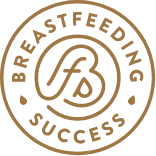By Ali Weatherford
I’m not a lactation consultant, but I did breastfeed two babies into toddlerhood. It wasn’t easy, but it was worth getting through the challenges.
In a lot of ways, I did have it easy though. My mom breastfed three babies at a time when it was a lot less acceptable than it is now. She did it even though no one else she knew was, and doctors did not tell her that it was a very healthy thing to do. She supported and encouraged me. She never questioned my decisions. I’ve had the benefit of a lot of education and a lot of breastfeeding support in my local community too. I also didn’t have to go right back to work and worry about maintaining a great milk supply or breastfeeding relationship with my babies.
Why We Celebrate National Breastfeeding Month
Not everyone is as lucky as I was. August is National Breastfeeding Month, and the first week of August is World Breastfeeding Week. This is a time to consider our own breastfeeding challenges and goals.
At Breastfeeding Success, it’s a time of celebration and appreciation for all the people who work every day to support the breastfeeding goals of families. It’s also a time when we work even harder to educate about and praise the benefits of breastfeeding.
You probably understand the value of breast milk or have at least heard of some of the many benefits that come from breast milk. It’s perfect nutrition at all the baby’s ages and stages, it supports healthy immune function, it helps prepare a baby’s body to digest food properly. These are some of the benefits that can only come from human breast milk.
Awareness days, such as National Breastfeeding Month, are not just for that reason though. Living in a rich, developed country like the United States can give us a very narrow perspective on issues sometimes. I’m guilty of this myself. These awareness days are an opportunity to open eyes about the many reasons to spread the word and educate about breast milk because we are also combating the devastating global effects of formula advertising and lack of education and support for breastfeeding.
Aggressive Promotion of Formula
During this month, formula producers will respond to breastfeeding awareness attempts with more aggressive advertising of its breastmilk substitute. You might start to notice this. I see the campaigns showing happy healthy babies that do not receive breast milk. I see celebrities and influencers supporting the use of formula and showing their own healthy and happy formula-fed babies.
There’s no doubt that while formula can’t provide the most optimum nutrition, it has become a very excellent source of nutrition for babies and that babies can thrive when fed formula. These campaigns are made with some good intention. I feel sure that those featured celebrities are doing this promotion because they want people to feel OK about their decision or need to use formula. They don’t want to be made to feel guilty about using formula, and they want to help other people feel less guilt too. That is a good thing.
It’s NOT OK to make people feel shame or suggest that they are bad parents if they use formula to feed their babies.
There are many good reasons to use formula, and each family should be able to make the choice that is right for them without fear of judgment. But highlighting the benefits of breastfeeding is not about shaming people. Unfortunately, another intention for these formula ad campaigns comes from the formula companies who are funding them. They want to sell more formula so they can make more money. It’s true that we are lucky to have advanced breast milk substitutes as an option, but this is where our privilege shows.
It’s critical to remember that in most of the world, formula is either not an option, or is not a safe option.
Highlighting the benefits of breastfeeding during National Breastfeeding Month is about normalizing breastfeeding and helping people who need or want to do it. Lately, the advertising strategy is to show beautiful famous people using formula to feed their beautiful healthy babies. This tells a certain story. It tells the story that it is fashionable, trendy, and desirable to use formula. Is this the message they should be sending to any people, but especially to those who can’t access formula? Are they now creating shame for those people who are too poor or remote to use this product?
This already happened in this country when formula was new. At first, formula producers told the story that formula was superior to breast milk, and people believed it. Parents and even doctors believed that story. so it became the preferred food for babies. But only the wealthy, the better educated, the white majority could access it. The fact is that formula is expensive, and using it safely and correctly requires a safe water supply and education.
Formula Use Issues in Developing Countries & Less-Resourced Communities
What is happening in developing countries or less resourced areas of our own country is often disastrous. UNICEF and The World Health Organization (WHO) estimate that approximately 800,000 babies and children die every year because of malnutrition or complications caused by improper formula feeding. This happens because of the aggressive promotion of infant formula products. Besides just hearing the advertising messages about the popularity or benefits of formula, people are sometimes given samples of formula at the hospital or at doctors’ offices. They believe it must be better or easier, so they begin to use it. This might mean that they do not breastfeed enough to develop a milk supply of their own and they become dependent on formula to feed their babies.
If these same people are very poor or live in an area without a safe water supply, it can become a life-threatening situation. They can’t find or afford formula, but they are not making enough milk to feed their babies. They might dilute the formula and unknowingly undernourish their babies. They might use unsafe water and babies get sick. This is not a hypothetical situation or a small problem. This is a global crisis, and one that can be prevented with better education and support about breastfeeding and less aggressive marketing by formula producers. Many countries have banned the use of predatory formula marketing for just this reason.
It’s an indisputable fact that we have a worldwide and devastating infant health crisis that is being fueled by formula makers. A lot of effort goes into creating better water sources, but they would also benefit from support and education about breastfeeding. This is the message that should be ranked most high, but the money is just not there to mount the kinds of campaigns that formula producers can afford.
What You Can Do
If you are breastfeeding, continue to do so! Feed your baby where others can see that you are. Normalize breastfeeding by doing it where it’s visible. If people ask you questions about your breastfeeding, answer them honestly. It’s important that people know that breastfeeding can be really challenging for some people, AND that those challenges can usually be overcome with some time and support.
If you see someone bottle feeding with formula, DON’T tell them that they should be doing something else or try to convince them of the benefits of breastfeeding. People use formula for so many different reasons. Always assume that they are using it because they HAVE to. It might be the right or only option for their baby, and they might be sensitive about this.
If you are formula feeding, don’t assume that all breastfeeding parents and lactation consultants are judging you for it. It’s true that some people do, and that is not OK. But not everyone does, and you will be much happier if you always assume that they support you and understand that every parent needs to make the choice that is right for their family. If you see someone struggling with breastfeeding, don’t tell them that they should use formula because it’s what worked for you or that it’s no big deal. They need to make their own decisions too, and some people do get past some initial struggles to find that they love breastfeeding and are very glad they did it.
From either direction, when you tell other people to make their choice based on what you have decided to do, they tend to get defensive. They might even start to assume that ALL people who have made the choice that you have made are judgmental and uppity or selfish and vain.
Remember that Baby Formula is a $55 Billion Industry
The companies that manufacture and sell infant formula can afford to advertise, and they are very good at it. Their campaigns used to be very aggressive and blatantly anti-breastfeeding, but because of newer international codes, they are restricted from using some of those more outrageous predatory marketing tactics.
Now the marketing is much more subtle, but it still has a profound effect on what people understand and choose. Try not to let their very impressive ad campaigns influence your decisions or how you feel about people who use formula OR people who breastfeed. New parents need to stick together! Parenting is hard enough without having to feel like you’re in a battle zone defending your choices.
To share some of the benefits of breast milk, we are highlighting this article on why to breastfeed that we published during National Breastfeeding Month in 2022. Please share it with anyone you think could benefit by reading it. AND please read or share this previously published article about HOW TO BREASTFEED. It’s so important to spread the word about the benefits of breastfeeding, but also about HOW TO DO IT! The article includes a mini video lesson by one of our favorite lactation consultants, Cassie.
Resources
https://www.latimes.com/archives/la-xpm-1991-05-19-mn-2981-story.html
https://www.nber.org/papers/w24452

